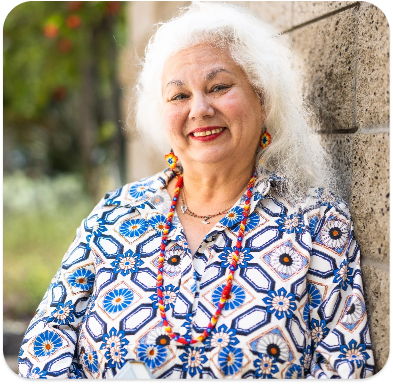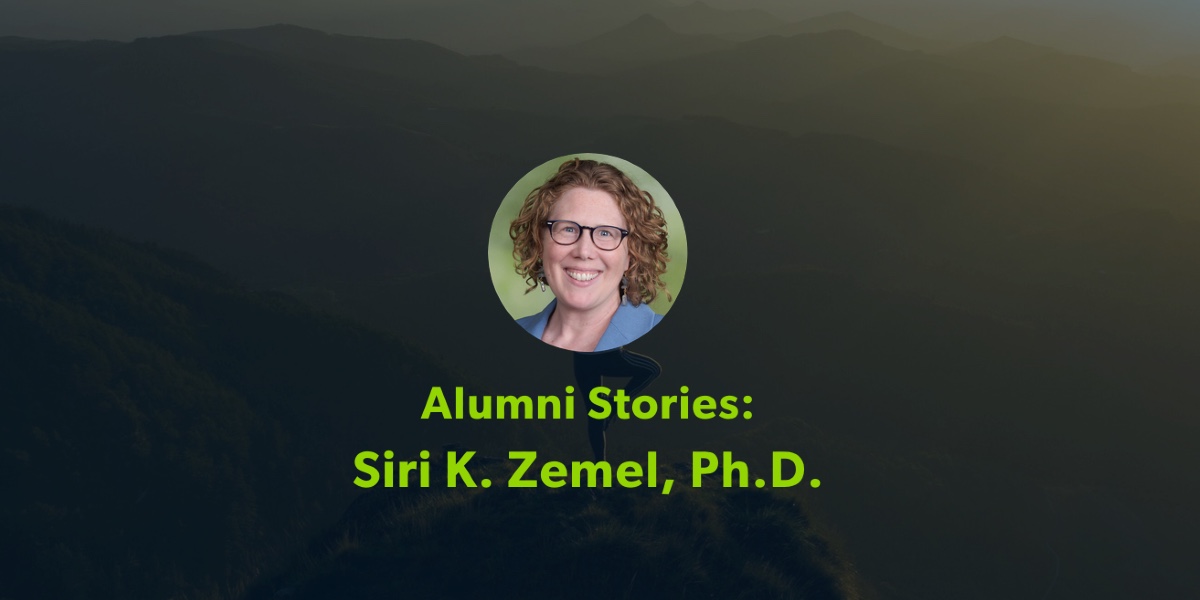Compassionate Care for Those at the End of Life
Our Ph.D. in Mind-Body Medicine: Contemplative End-of-Life Care Specialization program draws upon insights from psychology, medicine, sociology, philosophy, and spirituality to nurture profound understanding and compassion for those who wish to become an advocate for the dying and create optimal support, comfort, and care for those facing life's final chapter and their loved ones.
Within the Contemplative End-of-Life Care Specialization curriculum, you will study end-of-life decision-making, loss, grief, mourning, cultural humility, and much more.
This vital work goes beyond providing comfort in someone’s final days. In addition to the topics above, you will learn how to cultivate a courageous presence with the dying, provide mindful support to the grieving, and explore your own experiences and attitudes toward death.
Ph.D. in Mind-Body Medicine: Contemplative End-Of-Life Care Specialization Job Outcomes
Upon completion of the thanatology Ph.D. program, you will have an enhanced skill set and deepened perspective to augment your current practice or, with the appropriate licensure, expand into other roles and settings, including:
- Palliative care practitioners
- Hospice care coordinators
- End-of-life counselors or therapists
- Researchers
- Educators
Other Mind-Body Medicine Programs
Interested in another specialization in Mind-Body Medicine? We offer multiple doctoral programs that may align more closely with your goals.
- Ph.D. in Mind-Body Medicine
- Ph.D. in Mind-Body Medicine: Contemplative End-of-Life Care Specialization
- Ph.D. in Mind-Body Medicine: Integrative and Functional Nutrition Specialization
- Ph.D. in Mind-Body Medicine: Integrative Mental Health Specialization
- Ph.D. in Mind-Body Medicine: Integrative Wellness Coaching Specialization
- Ph.D. in Mind-Body Medicine: Mindful Leadership Specialization
- Ph.D. in Mind-Body Medicine: Specialization in Teaching and Advanced Research (STAR)
*Credits earned may vary based on specialization courses chosen
Program Components
Admissions Requirements
Applicants for the Ph.D. in Mind-Body Medicine degree must submit the following documents:
- An official transcript from an accredited university demonstrating successful completion of a master’s degree with a 3.0 GPA or better
- Resume or CV
- Personal statement
- Writing sample (if the department chair determines the personal statement contains grammatical mistakes, spelling errors, or poorly organized text)
New students must provide official transcripts showing completion of an undergraduate or graduate-level science course in the past 10 years, with a minimum grade of a B in anatomy and/or physiology. Without this introductory science prerequisite course, you will need to add IFN 5704 Anatomy and Physiology as an elective within your first year. Alternatively, you may complete the basic anatomy and physiology course from Saybrook’s academic partner, StraighterLine.
Invest in Your Future
Saybrook University remains committed to keeping higher education affordable and accessible. Our Financial Aid Department is ready to offer guidance and support in determining suitable financial assistance tailored to your needs, including potential scholarship opportunities, grants, and more.
Cost
Saybrook wants you to have the information you need to make an informed decision about your academic and career aspirations. Our cost calculator provides an estimated cost of attending Saybrook to earn your Ph.D. in Mind-Body Medicine: Contemplative End-of-Life-Care Specialization degree.
Career Outcomes
Saybrook University prepares you to make an impact in a variety of high-demand Mind-Body Medicine-related careers. Below, you will find possible career options and salaries associated with this degree.
Data is pulled by a third-party tool called Lightcast, which includes data from sources including the U.S. Bureau of Labor Statistics, the U.S. Census Bureau, online job postings, and other government databases. The information below represents a regional and national career outlook related to this online MBM doctoral degree program*. Saybrook University is dedicated to assisting you in achieving your career goals.
*Many degree programs are intended to fulfill licensure requirements in specific states. The data shown here may not represent the state where you currently reside. For more information on how this program is applicable to the requirements of your state, please speak with your admissions specialist.
Sample Courses
Contemplative Approaches to Thanatology
A foundational three-credit course providing a comprehensive overview of thanatology, the study of death and dying. In this course, you will examine various perspectives on the topic of dying, end-of-life decision-making, loss, grief, mourning, assessment and intervention, traumatic death, death education, and your individual experiences and attitudes toward end-of-life processes. This course will prepare you for the Association for Death Education and Counseling (ADEC) certification examination in thanatology.
Contemplative Inquiry and Creativity in the End-of-Life Relationship
In this three-credit course, you will explore ways in which cultivating creativity with contemplative inquiry can deepen your capacities for navigating the conditions intrinsic to end-of-life relationships. Engaging in creative activities can lead to personal and professional fulfillment and by activating your creative potential, you will design innovative community projects that can impact your personal, societal, and global relationships.
Evidence-Based Skills in CEOL
This three-credit course introduces evidence-based skills for palliative and end-of-life care that are foundational to the specialization and certificate. After engaging in a service-learning model throughout your semester, you will examine, integrate, and demonstrate evidenced-based skills in the realm of values, ethics, knowledge, communications, and professionalism in the practice of providing contemplative end-of-life care.
Catalog
Please refer to our academic catalog for more information on the Ph.D. in Mind-Body Medicine: Contemplative End-of-Life Care Specialization program.
FAQs
What is thanatology?
Thanatology is the study of death and grief. It integrates scientific, religious, spiritual, and psychological aspects into the examination of how people navigate this complex emotional and psychological process. Saybrook University’s Ph.D. in Mind-Body Medicine: Contemplative End-of-Life Care Specialization program draws upon insights from psychology, medicine, sociology, philosophy, and spirituality to nurture profound understanding and compassion for those who advocate for the dying and their loved ones.
What are some hospice care career options?
Graduates of this program have multiple opportunities to pursue a career in hospice care. Some hospice care jobs include hospice counselor, nurse, and social worker, among others.
Who is the Mind-Body Medicine End-of-Life Care program for?
This online doctoral program attracts students from a broad range of educational and career backgrounds in the health, wellness, and education fields. Nurses, therapists, social workers, counselors, and recent graduates from other degree programs often enroll in the online Ph.D. in Mind-Body Medicine: End-of-Life Care program.
Can I transfer into the online MBM leadership doctoral program?
Yes, most students can transfer up to 15 credits toward the Contemplative End-of-Life Care MBM doctorate program if they have completed graduate-level coursework at a regionally accredited institution. The Ph.D. program chair must evaluate the transfer credits for Mind-Body Medicine.
Transfer credits can significantly reduce tuition by decreasing the number of courses you need to complete.
Is the online doctoral Mind-Body Medicine program available to international students?
Yes, the Ph.D. in Mind-Body Medicine: Contemplative End-of-Life Care Specialization is available to international students seeking to earn their degree in the United States without relocating
Can I work while in the MBM Contemplative End-of-Life Care doctoral program?
Yes, our online doctoral program is designed for working adults, offering flexible schedules that support career advancement, career changes, and family responsibilities.
When does the online Ph.D. in MBM End-of-Life Care program begin?
The program has three start times: spring, summer, and fall, with application deadlines roughly a month before the start date.
University Learning Experience
The Ph.D. in Mind-Body Medicine: Contemplative End-of-Life Care Specialization is a 100% online program. While the core of this program is completed asynchronously, there are some optional synchronous, online features designed to deepen your educational experience. We call this a Virtual Learning Experience (VLE). In addition to the VLE, you will begin your studies with a virtual Welcome Week. Welcome Week activities, including a program orientation, are held online during the week before the start of Fall and Spring semesters. The in-person Community Learning Experience (CLE) is also available for you to explore. The CLE is held in odd-numbered years. It is optional and not required to complete the program.

Mind-Body Medicine Faculty
Saybrook’s Mind-Body Medicine faculty are practitioner-scholars dedicated to advancing their field through continued practice and comprehensive instruction. Meet one of our faculty members below.

- Palliative Psychology practice with a focus on spiritual midwifery at the end of life and grief support
- Recipient, CIMHS Faculty Excellence Award
- National leadership in the American Psychological Association
- Mentored by national and international end-of-life thought leaders including Charles Garfield, Ph.D., Joan Halifax, Frank Ostaseski, and Angeles Arrien, Ph.D
UNBOUND: Mind-Body Medicine
Guided confidently through our outcomes-based, person-centered approach to mind-body medicine, you will navigate the intersection of mental, emotional, and physical health to help care for those in need.


5 Health Care Careers for a Mind-Body Medicine Ph.D. With a Mindful Leadership Specialization

The Role of Nutrition in Mental Health
Ready to Take the Next Step?
Submit an inquiry and one of our admissions specialists will connect with you to answer your questions and guide you through next steps.
























